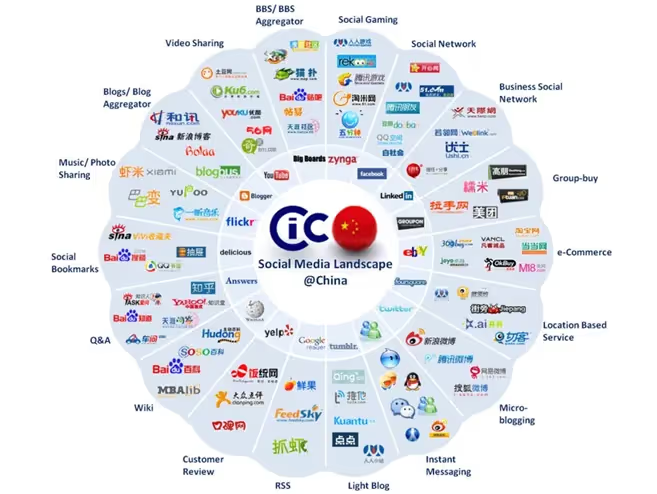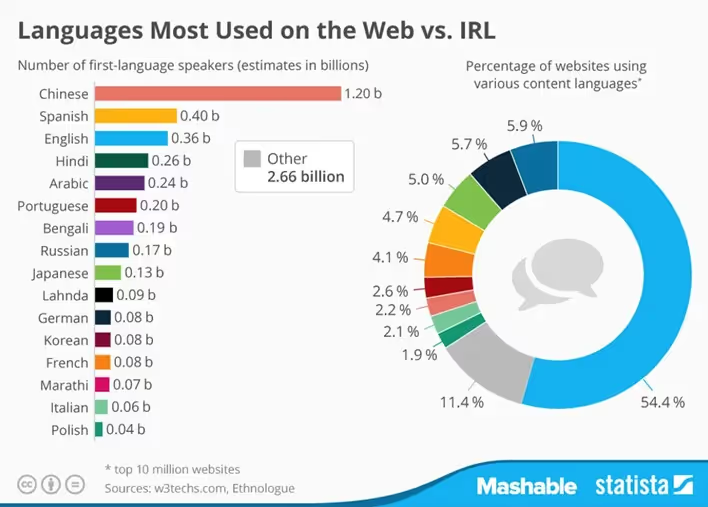Online Marketing in China - Introduction

Are you thinking of entering the Chinese market with your product or service? Or maybe you're already operating in China but do you feel like you haven't promoted yourself enough yet?
The Chinese digital market has nothing to do with the rest of the world, Everything we know in Marketing doesn't work in China. If you want to have a digital presence in China, you have to start from scratch, we must change the approach.
But entering the Chinese market is not an easy task, it is a country full of censorship and restrictions on the part of its Government. Chinese citizens live with alternative systems to European and American ones. For example, from China you can't visit Google, YouTube, Wikipedia, Twitter, Reddit, Netflix, Instagram, Whatsapp, Facebook, Pinterest, etc. Since September 2019, around 10,000 domains have been blocked in China.
Differences between China and the Rest of the World
As we mentioned, accessing the Chinese market is not as easy as it seems, Everything we know in the West doesn't exist in China, is like a parallel universe with its social networks, search engines, applications, etc. We have to be aware that users in China think and act differently from the rest of the world.

As we can see in the image above, in China they have their own search engines, their social networks, their e-commerce, their video platforms, etc. If we want to be digitally successful in China, we must be fully aware of the following services:
Baidu:
It is the most used search engine in China, its design is similar to that of Google and includes the possibility of searching for news, images and songs, among other functions. It is currently the 4th most visited website in the world. Perhaps Baidu's most popular feature, which other search engines like Google don't offer, is the ability to search for audio files. From an SEO point of view, Baidu is considered simplified Google, because the algorithm is very similar to Google's, but the crawlers are much less powerful and are not yet able to follow modern web technologies such as, for example: JavaScript.
Alibaba:
It is the largest retailer in China, we could define it as a mix between Amazon, eBay and PayPal. Alibaba operates worldwide but practically 80% of all sales come from China. It currently has 4 million suppliers from more than 200 different countries. One of the Alibaba group's most powerful products is AliPay, a payment platform that dominates both the world of online and offline payments.
Taobao:
It's another very famous e-commerce in China, part of the Alibaba group. It facilitates business for consumption, offering a platform for companies and individual entrepreneurs to open online stores that supply consumers across China and beyond.
Weibo sign:
It's a Chinese microblogging social network, we could define it as Chinese Twitter. It is used by approximately 30% of Internet users in China, reaching a penetration close to that of Twitter in the United States.
WeChat:
It's a mobile text messaging, voice messaging and video calling service. It currently has approximately 1.1 billion users. Often compared to WhatsApp, WeChat is much more advanced because it has a series of advantages for businesses, including customer service channels and the ability to sell services directly in the app.
Thinking about Mobile
China has more than 800 million users on the Internet and 98% of them access it from their mobile phones.

Another very important fact to keep in mind: Chinese users download an average of 44 apps. The global average is 26 apps per smartphone user. This data makes it impossible for brands seeking success in China to ignore digital, and even more so, mobile. There is no country more Mobile than China.
For example, WeChat is one of the most downloaded applications, last year it registered more than 1 billion monthly active users, of which 900 million used the application daily.
Importance of Language: Chinese
It is estimated that there are approximately 7,000 different languages in the world. But, according to W3techs and Ethnologue, the most used native language is Chinese with 1.20 billion people (1 in 6 people), followed by Spanish with 0.40 billion people and English with 0.36 billion people.
But in comparison, English is the most used language in Internet content with 54.4%, while Chinese has only 2.2% of content.

If we want to position ourselves in the Chinese market, we must take into account everything mentioned above, above all, we must take into account the International SEO. You must ensure that your international audience can successfully find you and navigate to the most relevant section of your website, either in the right language or through content aimed at a particular country. In other words, you should focus your efforts on the market or sector you are targeting, in this case the Chinese one.
It's very It is important to adapt your website to search engines in China (Baidu, Haosou 360 and Sogou) and understand how their algorithms work.
The main drawback is the fact that the tools are only accessible in Chinese, so if you want to use the large amount of data that Baidu offers, you need a specialist with the language skills and the right understanding of the market.
In China, the opportunity to reach your potential customer is very great, but many companies don't know how to do it or don't take advantage of the potential of the large number of tools they have at their disposal to achieve success.
On October 16, we held the seminar “Digital Success in China” sharing some practical tips on how to establish or improve your online presence in China, as well as some strategies that help you take advantage of this large market.
If you want to target the Chinese market and don't know how to start, we recommend that you contact our international SEO expert, Natalia Witczyk.
How can we help you?
If you need more information do not hesitate to contact us.
Cómo podemos ayudarte
Consulta los servicios con los que te ayudaremos a conseguir tus objetivos digitales.
